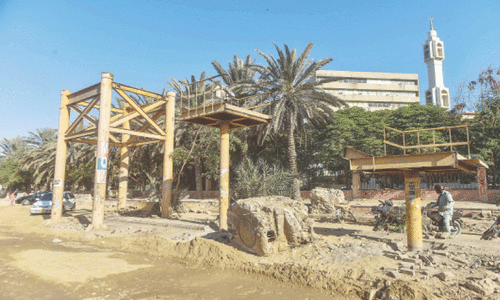 LAHORE, Oct 9: Javed Iqbal Mughal, who hit headlines by confessing to killing 100 children and was convicted on the same charge, died in mysterious circumstances in his cell in the Kot Lakhpat Jail on Tuesday
LAHORE, Oct 9: Javed Iqbal Mughal, who hit headlines by confessing to killing 100 children and was convicted on the same charge, died in mysterious circumstances in his cell in the Kot Lakhpat Jail on Tuesday
His accomplice, Sajid, also a condemned prisoner, was also found dead in separate cell.
The jail authorities claim that the two had committed suicide. But the circumstantial evidence and the condition of the two bodies belied the official claim.
Detained in separate but adjacent cells in Block 7 of the jail, Javed, 40, and Sajid, 20, were found hanging at 5am, jail superintendent Mian Farooq told reporters. “We are investigating the matter and nothing has so far been ascertained,” he said.
AIG prisons Abdussattar Ajiz claimed that the two prisoners had committed suicide sometime between 10pm and 2am when one Iftikhar Husain was on guard duty outside the cells. He quoted the guard as having said: “I was asleep when the incident took place”.
Mr Ajiz said that the guard saw the two prisoners hanging with bedsheets tied to iron bars of the cells when he woke up. The guard untied knots of the bedsheets and laid the bodies on the floor to create an impression that they were asleep. He did so to save his skin. Then he left at 2am without informing the authorities about the incident, he said.
The AIG said that another official Liaquat Ali replaced the first guard who, too, did not bother to check the prisoners. In the morning, he said, the head warden of the block found them dead when he woke them up.
Police investigators, however, believed that committing suicide this way was not easy and especially when two people were doing so at the same time.
Senior jail officials, doctors, a magistrate and police rushed to the prison. The bodies were sent to the city mortuary for autopsy.
Strangulation marks were found around the blood splashed necks of the two prisoners, doctors in the mortuary said. They said hands, feet and nails of the deceased had gone blue. They were bleeding from mouth and nostrils and tongue of one of them had a cut mark, the doctors said. An injury mark was also found around Sajid’s neck, they said, adding that countless healed wounds inflicted with a blunt weapon were also found on all over the body of Javed Iqbal.
Nobody from Javed’s family turned up to collect his body. His brothers Parvez Mughal and Saeed Mughal said that Javed had died for them the day he had confessed to killing 100 children. “We have nothing to do with him,” they said, adding that they would not collect the body.
Javed had made over dozen attempts to commit suicide, a jail official claimed while talking to reporters at the city mortuary. “His behaviour was strange,” he said, claiming “Javed would start demanding milk at midnight. Sometimes, he would demand fruit which was not available in market. He used to keep the jail staff engaged.”
Javed Iqbal was detained in the jail since he made a dramatic surrender at the office of an Urdu daily on Dec 30, 1999. The surrender brought an end to the country’s biggest manhunt that was launched after Javed himself conveyed the details of his crime to the authorities in the last week of November, 1999, through parcels filled with evidence and pictures of his victims.
Besides the parcels, the serial killer left two human skeletons in an acid-filled container at the house from where the police recovered at least nine bags carrying clothes and shoes of the victims.
The parcels also contained a personal diary and a notebook of the self-confessed killer giving each and every detail of his murder. A letter bearing confessional statement of Javed was also attached with the parcels which read: “I had sexually assaulted 100 children before killing them, and had disposed of their bodies in barrels of acid.” A similar parcel was also sent to the office of an Urdu daily.
Newsmen were the first to reach a three-room dingy house along Ravi Road which was pointed out in the letter. The reporters and police found placards neatly pinned to the interior walls of the house giving details about the victims and how they were murdered.
A placard read: “All details of the murders are contained in the diary and the 32-page notebook that have been placed in the room and had also been sent to the authorities. This is my confessional statement.” Another placard read: “The bodies in the house have deliberately not been disposed of so that the authorities will find them after my suicide.” Yet another placard said: “I am going to jump into the river Ravi to commit suicide.”
The claim referring to committing suicide, however, turned fake when two accomplices of Javed were arrested from Sohawa while attempting to encash a traveller cheque and later when he himself surrendered. Families of almost all the 100 children from all over the country identified their pictures, shoes and other evidence at the Ravi Road police station. During investigation of the case, an accomplice Ishaq, alias Billa, of the killer died in the CIA custody when he reportedly jumped down from a window at the third floor of the CIA headquarters on Dec 7, 1999. As a punishment, the entire administration of the Lahore police was changed.
Hearing of the case started in the court of additional sessions judge Allah Bukhsh Ranjha on Feb 8, 2000. Javed and his accomplices were formally indicted on Feb 17, 2000, and they all pleaded not guilty. During the proceedings, the serial killer kept on changing his statements, claiming sometime that the children were alive and saying that he had killed the 100 boys in revenge to the “injustice meted out to him.”
Javed was sentenced to death on 100 counts on March 16, 2000. In the verdict, the judge said that Javed and his co-accused Sajid in the presence of the families of their victims be strangled with the same iron chain which they used as a weapon of offence, their bodies be cut into pieces and put into a drum containing acid as they did with those of the dead children.
Javed filed an appeal before the Lahore High Court against his death sentence. After being pending for many months, the LHC referred the appeal to the Shariat Court, saying that it did not fall in its jurisdiction.
In his diary and notebook, Javed had portrayed himself as a victim of “police system, irregularities in jail system in Pakistan and injustice in other sections of society.” According to his confessional statement, he and his accomplices used to lure teenaged boys from the shrine of Data Sahib and other such places to bring them to the Ravi Road house and kill them after sexual assault.










































